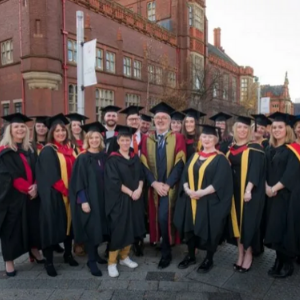
Northumbria University’s first cohort of students to study on the Transforming Care-commissioned Positive Behavioural Support programmes have graduated.
Positive Behavioural Support (PBS) is an evidence-based approach which is recognised as best practice in supporting people with learning disabilities and behaviours that challenge. Through assessing the wider social, physical and individual contexts in which such behaviour occurs, it aims to facilitate the understanding of behaviour in order to develop support. The overall goal is to improve a person’s quality of life and the lives of people around them and minimise the chances of behaviour that challenges happening in the first place.
Due to a lack of guidance about how best to support people to learn about the PBS approach, the North East and North Cumbria Transforming Care Partnerships workforce group commissioned Northumbria University to develop and evaluate a range of accredited learning programmes in Positive Behavioural Support for the North East and North Cumbria. Cumbria, Northumberland, Tyne and Wear NHS Foundation Trust are proud to have been closely involved in the development of this programme.
The programme’s ambition is that positive behavioural support approach will become a way of life across health, social and education care in the North East and Cumbria.
We are proud to have been closely involved in the development of this innovative programme. The courses are being independently evaluated, and early analysis suggests a really positive impact on staff’s competencies and confidence.
We are looking forward to working with the University and colleagues from Tees, Esk and Wear Valley NHS Foundation Trust during 2020, when the level 7/6 courses will be made available to some of our staff working in specialist community teams. This is the next exciting step in promoting the systemic change needed to improve the lives of people with learning disabilities and their families.
Jill ChaplinConsultant Psychological Therapist at Cumbria, Northumberland, Tyne and Wear NHS Foundation Trust
It also aims to reduce the need of inpatient care by upskilling the existing health, social and education workforce in adopting this approach and enable improved support for people with learning disabilities and their families.
Dr Anne McNall, former PBS programmes Project Lead and Associate Professor at Northumbria University, led the scoping exercise to understand need and the innovative workforce development approach used in this project: “Purely training staff in a particular approach is often ineffective and does not lead to sustainable change as it does not address organisational and other barriers to implementing new practice; this requires whole system change such as cultural shift, the development of new policies, practices, ongoing supervision and support for staff to work in new ways.
“The development of innovative regional PBS workforce development manager posts working in partnership with the University supported staff to develop not only new knowledge, but apply their learning in practice and receive regular support to lead change in their organisations and staff teams.”
The University developed different levels of PBS learning programmes to reflect the fact that PBS is often provided by a variety of people with a range of competencies.
The first cohort of 32 graduates studied on the Level 6 or Level 7 programme, meaning they have gained an Advanced Diploma or Post Graduate Certificate respectively. PBS learning programmes at this level are intended for those Practice Leaders who are responsible for leading and supporting organisations to use PBS, with other programmes available at level 4 for practice facilitators who lead teams, support workers and family carers.
Following an interim evaluation, it is reported that the programmes have resulted in a range of positive impacts at individual, team, organisational and system-wide levels. These include positive changes for those being supported in terms of better and more consistent support, reduced behaviours that challenge and increased quality of life. Better engagement and relationships with families have also been reported.
Judith Thompson, Network Manager and Assurance Lead for the North East and Cumbria Leaning Disability Network, said: “I am immensely proud of the graduates. Developing and delivering this post graduate course is testament to what can be achieved when organisations work collaboratively that ultimately positively impacts on quality of life for people with learning disability.
“The Learning Disability Workforce Development Managers have played a huge role in providing work-based supervision and support in addition to delivering the university based programmes for each of the graduates hugely influencing organisational change.”
The nine-month-long Level 6 and Level 7 programmes have been delivered through blended learning. This involves a combination of University-based induction time, e-learning, locally delivered workshops, alongside guided study, practice-based learning and supervision with academic and competency assessments.
Graduates from the programmes are employed by a variety of 27 different social care service providers, ranging from national, widely recognised charities such as Mencap through to smaller, family-run organisations including Gateshead-based Ashdown Care.
Speaking about the PBS programme, Level 7 graduate and founder of Resolve Care in County Durham, Anne Graham, said: “PBS mirrors what we do in our homes and the course has really helped make the knowledge transfer more fluid. The resources were great and helped us to put theory into practice so that PBS flows right through our organisation.”
Fiona Kelly, Mencap Area Operations Manager for Redcar and Cleveland, said: “The course was truly transformative. We thought we knew a lot about PBS, but we learnt so much more, all of which is completely translatable to the workplace. We have already noticed the difference what we have learnt is making within the organisation.”
Operations Manager and PBS Practitioner at Positive Support for You, Sue Paton, commented: “This course was the most practice enhancing academic course I have ever experienced. Fantastic, hard work, bereft there was not a further year of study!”
